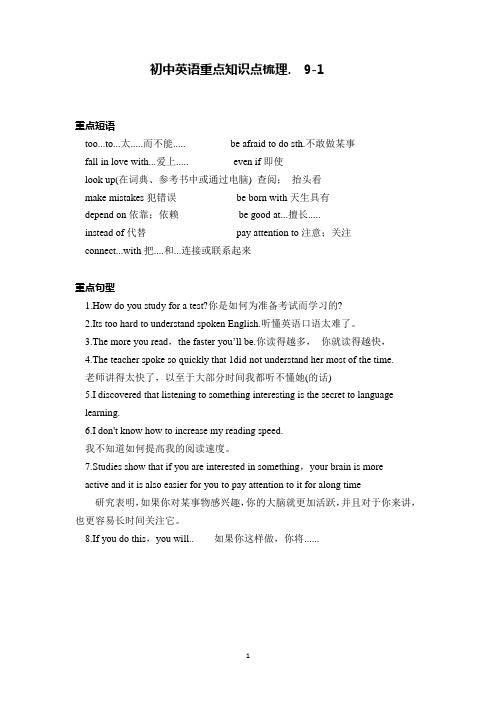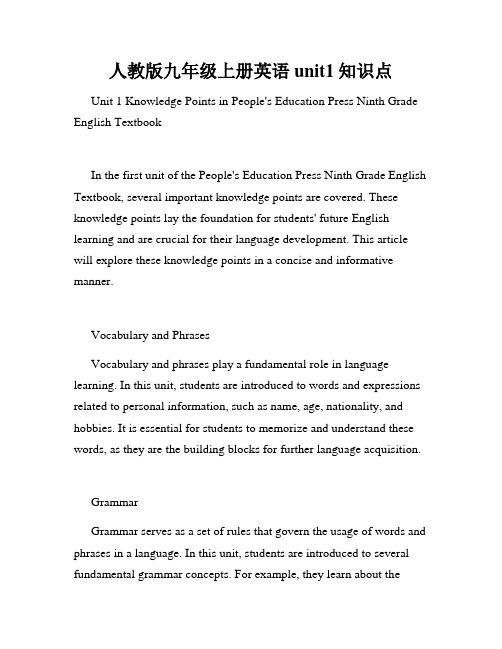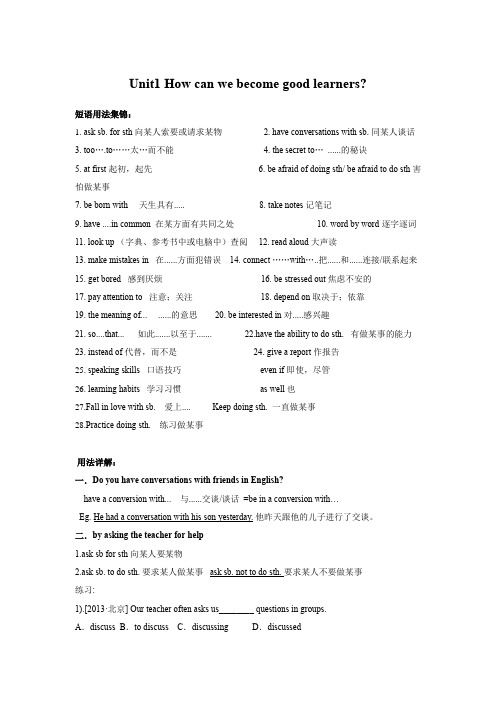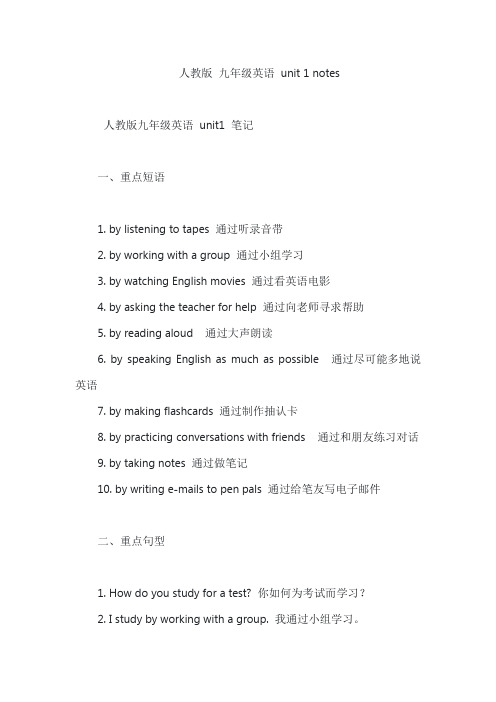人教版初三英语上unit1知识点讲解及练习
九年级英语人教版unit1知识点

九年级英语人教版unit1知识点九年级英语人教版Unit 1知识点九年级英语人教版Unit 1是我们初中九年级的第一个单元,主要涵盖了一些基础的语法知识和日常生活中常用的词汇。
通过学习这个单元,我们可以巩固和拓展我们的英语知识,为以后的学习打下坚实的基础。
首先,我们来了解一下这个单元的几个主要语法点。
一是现在进行时,它用来表示现在正在进行的动作或临时的行为。
例句:“I am watching TV now.”;二是一般将来时,表示将要发生的动作或存在的状态。
例句:“We will go on a trip next week.”;三是一般过去时,用来表示过去发生的动作或存在的状态。
例句:“I ate a delicious cake yesterday.”除了这些语法知识,Unit 1还包括了一些常用的词汇,例如名词、形容词、副词和动词等。
掌握这些词汇对提高我们的阅读和写作能力非常有帮助。
我们可以通过读英语文章,积累更多的词汇量,同时还要多进行听说训练,以提高我们的口语表达能力。
此外,Unit 1还涉及了一些与日常生活相关的话题,如介绍自己的家人、朋友和爱好等。
通过学习这些话题,我们可以提高自己的沟通能力,并且了解更多关于他人的信息。
在这个单元中,我们还可以学到一些有关礼貌用语和表扬他人的方式,这对培养我们的社交能力也非常有帮助。
如何有效地学习Unit 1呢?首先,我们可以做一些练习题来巩固所学的知识。
可以选择一些与课本相关的练习题,也可以在课外找一些相关的习题进行练习。
除了做题,我们还可以尝试进行听力和口语训练,提高自己的听说能力。
另外,我们还可以组织小组活动,与同学们一起进行口语对话练习,互相交流学习。
最后,对于Unit 1的学习,我们还要培养自己的学习兴趣和学习方法。
我们可以选择一些适合自己的学习材料,如英语小说、英语电影等,激发学习的兴趣。
同时,我们还可以通过制定学习计划和做好时间管理,合理分配学习和娱乐的时间,提高学习效率。
Unit 1 重点知识点讲解梳理和练习 2021-2022学年人教版英语九年级上册

初中英语重点知识点梳理. 9-1重点短语too...to...太.....而不能..... be afraid to do sth.不敢做某事fall in love with...爱上..... even if即使look up(在词典、参考书中或通过电脑) 查阅;抬头看make mistakes犯错误be born with天生具有depend on依靠;依赖be good at...擅长.....instead of代替pay attention to注意;关注connect...with把....和...连接或联系起来重点句型1.How do you study for a test?你是如何为准备考试而学习的?2.Its too hard to understand spoken English.听懂英语口语太难了。
3.The more you read,the faster you’ll be.你读得越多,你就读得越快,4.The teacher spoke so quickly that 1did not understand her most of the time.老师讲得太快了,以至于大部分时间我都听不懂她(的话)5.I discovered that listening to something interesting is the secret to language learning.6.I don't know how to increase my reading speed.我不知道如何提高我的阅读速度。
7.Studies show that if you are interested in something,your brain is moreactive and it is also easier for you to pay attention to it for along time 研究表明,如果你对某事物感兴趣,你的大脑就更加活跃,并且对于你来讲,也更容易长时间关注它。
人教版初三英语上unit1语法讲解及练习

Unit 1: How do you study for a test?【重点短语】查阅组成;编造取笑(某人)谈论,讨论与某人说话将…视为..突然中止;中断以…结束犯错误不敢去做一点也不英语口语做笔记处理(时间) 过去在某人的帮助下=决定做某事练习做某事担心某人/ 某事=尽某人最大努力对某人感到生气愉快地做某事做某事有困难【重点语法】1.动名词在动词后加ing为动名词doing,相当于名词,在句子中可以做主语、宾语、表语、定语等。
(1)作主语(谓语为第三人称单数)Memorizing the words of pop songs also helps a little.记流行歌曲的词也起作用。
Swimming is good for our health.(2)作宾语在动词(keep\practice\finish \enjoy\hate\be busy\mind) 后只用—ing 作宾语Eg. We should keep speaking English in class.He often practices singing in the morning.I have finished reading the book.Would you mind opening the door?(3)作表语Babysister’s job is washing,cooking and taking care of the children.(4)作定语I think that doing a lot of listening practice is one of the secrets……2. 动词不定式及动名词在句中成分(1)做定语—后置The best way to learn English is reading aloud.The fastest way to travel is by plane(2)与所修饰的名词构成动宾关系I need a pen to write with.I don’t have a partner to practice English with.I need some paper to write on.I don’t have a room to live in.3.现在完成时复习A.表示过去发生或已经完成的动作对现在造成的影响或结果,或从过去已经开始,持续到现在的动作或状态。
人教版九年级上册英语unit1知识点

人教版九年级上册英语unit1知识点Unit 1 Knowledge Points in People's Education Press Ninth Grade English TextbookIn the first unit of the People's Education Press Ninth Grade English Textbook, several important knowledge points are covered. These knowledge points lay the foundation for students' future English learning and are crucial for their language development. This article will explore these knowledge points in a concise and informative manner.Vocabulary and PhrasesVocabulary and phrases play a fundamental role in language learning. In this unit, students are introduced to words and expressions related to personal information, such as name, age, nationality, and hobbies. It is essential for students to memorize and understand these words, as they are the building blocks for further language acquisition.GrammarGrammar serves as a set of rules that govern the usage of words and phrases in a language. In this unit, students are introduced to several fundamental grammar concepts. For example, they learn about theformation and usage of the simple present tense, which is used to describe general truths, habits, and routines. They also learn about the subject-verb agreement, ensuring that the verb agrees with the subject in terms of number and person. Understanding and applying these grammar concepts will allow students to communicate effectively in English.Reading and Listening ComprehensionReading and listening comprehension are essential skills for language learners. In this unit, students are exposed to various texts and conversations that help improve their reading and listening abilities. They practice listening for specific information and identifying main ideas. Additionally, they learn how to infer meaning from context and make predictions. These skills not only enhance their understanding of English texts but also contribute to their overall language proficiency.Speaking and WritingSpeaking and writing are productive language skills that require practice and proficiency. In this unit, students are encouraged to engage in conversations and write brief paragraphs about themselves and their classmates. They learn how to introduce themselves, talk about their hobbies, and ask questions to others. Through these activities, studentsdevelop their ability to express their thoughts and ideas in English, expanding their communicative competence.Cultural KnowledgeUnderstanding cultural differences and practices is an important aspect of language learning. In this unit, students are exposed to different cultures through texts and conversations. They learn about various nationalities, traditions, and customs. This cultural knowledge fosters tolerance, open-mindedness, and respect for diversity. It also enhances their cultural awareness, helping them develop into global citizens.Revision and AssessmentAt the end of the unit, students engage in revision and assessment activities. They review the vocabulary, grammar, and skills they have learned and consolidate their understanding. Revision may include practice tests, quizzes, or group discussions, enabling students to reflect on their progress and identify areas that require further improvement.ConclusionUnit 1 of the People's Education Press Ninth Grade English Textbook covers a range of important knowledge points. Fromvocabulary and grammar to reading and listening comprehension, speaking and writing, and cultural knowledge, students gain a solid foundation in English language learning. The comprehensive approach of this unit ensures that students develop various language skills and grow into competent English users. By mastering these knowledge points, students lay the groundwork for their future English studies and enhance their overall communication abilities.。
新人教版九年级英语Unit1 How can we become good learners?知识点及测试(附答案)

Unit1 How can we become good learners?短语用法集锦:1. ask sb.for sth向某人索要或请求某物2.have conversations with sb.同某人谈话3.too….to……太…而不能4.the secret to…......的秘诀5.at first起初,起先6.be afraid of doing sth/be afraid to do sth害怕做某事7.be born with 天生具有.....8.take notes记笔记9.have....in common在某方面有共同之处10.word by word逐字逐词11.look up(字典、参考书中或电脑中)查阅12.read aloud大声读13.make mistakes in在......方面犯错误14.connect……with…..把......和......连接/联系起来15.get bored感到厌烦16.be stressed out焦虑不安的17.pay attention to注意;关注18.depend on取决于;依靠19.the meaning of... ......的意思20.be interested in对.....感兴趣21.so....that... 如此.......以至于.......22.have the ability to do sth.有做某事的能力23.instead of代替,而不是24.give a report作报告25. speaking skills 口语技巧even if即使,尽管26. learning habits学习习惯as well也27.Fall in love with sb. 爱上.... Keep doing sth. 一直做某事28.Practice doing sth. 练习做某事用法详解:一.Do you have conversations with friends in English?have a conversion with... 与......交谈/谈话=be in a conversion with…Eg.He had a conversation with his son yesterday.他昨天跟他的儿子进行了交谈。
人教版九年级上册Unit1语法、阅读、写作专题

人教版九年级上册Unit1语法、阅读、写作专题语法专题一、by+动名词1."by+动名词"在句中常作方式状语,表示方法、手段、途径等,意为“通过……;用……借助……”,其位置可在句首或句末。
例:By getting up early,I can have an hour reading English in the morning.靠起得早我早晨有一个小时的时间朗读英语。
He improved his listening by listening English songs他通过听英文歌曲提高了听力(水平)。
链接中考(重庆中考)You can improve your English ______practicing more.A.byB. withC. ofD.in解析:空格后 practicing more(多练习)是 improve your English(提高你的英水平)的一种途径,by此处意为“通过”。
句意:你可以通过多练习来提高你的英语水平。
选A。
2.“by+动名词”可以用来回答how引导的特殊疑问句。
例:-How will you catch up with your classmates?你将怎样赶上你的同班同学-By working hard.通过努力学习。
-How do you learn math?你是如何学习数学的?-I learn by doing exercises.我通过做练习学习。
知识拓展(1)with+名词,表示用某种工具或自身的某种器官。
She often writes with her left hand.她经常用她的左手写字。
(2)in+名词,表示用某种材料或语言。
Now he begins to paint in oils.现在他开始画油画了。
方法技巧by, with与inby方式及方法,with有形的工具,语言材料in替换。
二、现在完成时现在完成时的谓语由“助动词have/has+动词的过去分词”构成。
初三人教版英语第一单元讲解及练习Unit1 How do you study for a test?

Unit1 How do you study for a test?一、重点回顾(一)重点词汇、短语1. by + doing 通过……方式如:by studying with a groupby 还可以表示:“在…旁”、“靠近” 如:I live by the river. / The thief entered the room by the window.“在…以前”、“截止…为止“如:I have to go back by ten o’clock.“乘交通工具” 如:The student went to park by bus.2.talk about 谈论,讨论如:The students often talk about movie after class.学生们常常在课后讨论电影。
talk to sb. === talk with sb. 与某人说话3. 提建议的句子:①What/ how about +doing sth.? 如:What/ How about going shopping?②Why don’t you + do sth.? 如:Why don’t you go shopping?③Why not + do sth. ? 如:Why not go shopping?④Let’s + do sth. 如:Let’s go shopping⑤Shall we/ I + do s th.? 如:Shall we/ I go shopping?4.a lot 许多常用于句末如:I eat a lot. 我吃了许多。
a lot of 许多用于句中如:Running a hotel needs a lot of money.5. too…to太…而不能常用的句型too+adj./adv. + to do sth.如:I’m too tired to say anything. 我太累了,什么都不想说。
人教版 九年级英语 unit 1 notes

人教版九年级英语unit 1 notes人教版九年级英语unit1 笔记一、重点短语1. by listening to tapes 通过听录音带2. by working with a group 通过小组学习3. by watching English movies 通过看英语电影4. by asking the teacher for help 通过向老师寻求帮助5. by reading aloud 通过大声朗读6. by speaking English as much as possible 通过尽可能多地说英语7. by making flashcards 通过制作抽认卡8. by practicing conversations with friends 通过和朋友练习对话9. by taking notes 通过做笔记10. by writing e-mails to pen pals 通过给笔友写电子邮件二、重点句型1. How do you study for a test? 你如何为考试而学习?2. I study by working with a group. 我通过小组学习。
3. It’s too hard to understand the voices. 声音太难听懂了。
4. What about reading aloud to practice pronunciation? 大声朗读来练习发音怎么样?5. I have a lot of trouble memorizing new words. 我在记新单词方面有很多困难。
6. I find it easy to learn English. 我发现学习英语很容易。
三、词语辨析1. too...to... 太……而不能……,表否定so...that... 如此……以至于……,表肯定例:He is too young to go to school. 他太小了以至于不能去上学。
- 1、下载文档前请自行甄别文档内容的完整性,平台不提供额外的编辑、内容补充、找答案等附加服务。
- 2、"仅部分预览"的文档,不可在线预览部分如存在完整性等问题,可反馈申请退款(可完整预览的文档不适用该条件!)。
- 3、如文档侵犯您的权益,请联系客服反馈,我们会尽快为您处理(人工客服工作时间:9:00-18:30)。
Unit 1: How do you study for a test?【重点短语】look up 查阅make up 组成;编造laugh at sb. 笑话;取笑(某人)talk about 谈论,讨论talk to sb. 对某人说talk with sb. 与某人说话regard … as…将…视为..break off 突然中止;中断end up with以…结束make mistakes 犯错误be afraid to do不敢去做not at all 一点也不spoken English 英语口语take notes 做笔记deal with处理go by (时间) 过去with the help of sb. 在某人的帮助下=decide to do sth. 决定做某事practice doing 练习做某事worry about sb./ sth. 担心某人/ 某事=try one’s best (to do)尽某人最大努力be angry with sb.对某人感到生气have fun doing sth.愉快地做某事做某事有困难【语言点】1.by 的用法:I study by working with a group.“通过……方式”如:by studying with a group“在…旁边/附近”如:The teacher stands by the window. / I live by the river.“在…以前”、“截止…为止“如:I have to go back by ten o’clock.“乘交通工具”如:The student went to park by bus.“被”如:some articles written by Lu Xun.2.practice的用法: Do you ever practice conversations with your friends?un. “实践,练习,锻炼”:Practice makes perfect. 熟能生巧。
v. “练习”= practise [英]:+n. We often practice English in groups.+pron. We should practice them in pairs.+v.-ing We should practice English more.3.ask的用法:ask sb. about sth.问某人某事He asked me about the best way to learn English yesterday.ask sb. to do sth.要求/让/请某人做某事:He asked his mother to buy him a new bicycle.ask sb. for sth.向某人要某物My mother asked me for help yesterday.4.[a lot, a lot of, lots of]①a lot 许多,大量如:I ate a lot last night.非常如:I love the movie a lot.②a lot of 相当于lots of 修饰n.用于肯定句中,否定句中常用many或much5.征求意见句型①What/ how about +doing sth.? 如:What/ How about going shopping?②Why don’t you + do sth.?=Why not + do sth. ? 如:Why don’t you go s hopping? /Why not go shopping?③Let’s + do sth. 如:Let’s go shopping④Will/ Would/Could you please do…? 如:Could you please pass that book to me?⑤Shall we/ I + do s th.? 如:Shall we/ I go shopping?⑥Would you mind doing…? 如:Would you mind turning the radio down?6.find的用法:Sometimes, he finds watching movies frustrating because the people speak too quickly.find + n./pron./ 介词短语/ 分词)it 做形式主语I find him friendly.We found him in bed.We found her honest.He found the window closed.I found him working in the garden.③it 还可作形式主语:It is + adj. + to do7.We get excited about something and end up speaking in Chinese ./ 过去分词/ 现在分词)使某种情况发生把鞋擦干净Get the shoes clean.我想去修自行车I want to get my bike repaired.你不能让他老等着You can’t get him waiting.②get 可作系动词Be(am /is /are /was /were)系动词表保持(stay /keep)表改变(get /become /turn)+adj.感官动词(…起来):feel /look /sound /smell /taste……③end 的用法:at the end of …“在…的末尾、末端” At the end of the concert at the end of the road n. in the end “最后”,“终于” (at last, finally ) In the end I decided to stay here.by the end of “到…结束时/…时为止By the end of this summer holiday, I had finished my homework.v. end up doing sth. 结束做某事= finish doing sth.end up with 以…结束The party ended up with her singing.8.“参加”join 参加某种组织,成为其中一员join in 参加竞赛、娱乐、游戏等活动join sb. 加入某人的行列take part in 参加会议或群众性的活动9.afraid的用法:I was afraid to speak in class……that+从句恐怕…I’m afraid that I can’t come here on time.be afraid to do sth.不敢做某事She was afraid to go out alone at night.of害怕I was afraid of snakes when I was young.10.deal with 处理:How do we deal with our problems?deal with:侧重于方式,方法,特殊疑问句中用how I don't know how he deal with the problem.do with: 侧重对象,特殊疑问句用what I don't know what he did with the problem.11.unless除非,假如不,如果不。
引导条件状语从句如:You will fail unless you work hard..假如你不努力你会失败。
I won’t write unl ess he writes first. 除非他先写要不我不写12.see sb. / sth. doing看见某人正在做某事强调正在发生see sb. / sth. do看见某人在做某事如:She saw him drawing a picture in the classroom. 她看见他正在教室里画画。
13.“也”also 也、而且(用于肯定句)常在句子的中间either也(用于否定句)常在句末too 也 (用于肯定句) 常在句末【重点语法】1.动词+ by doing 结构2.动词不定式及动名词在句中成分3.现在完成时复习例题( ) 1. Look at the old man. He makes money selling old books.A. inB. forC. atD. by( ) 2. --- How do you improve you English?--- By .A.read and speakB.to read and to speakC.reading and speakingD.reading and speak ( ) 3. Did you find very interesting to play football?A. thisB.itsC. thatD. it( ) 4. The sports meeting will continue it rains this afternoon.A. butB. sinceC. as soon asD.unless( ) 5. ---Many students don't know how to ____________ stress.---I think they'd better ask their teachers for help.A. argue withB. deal withC. quarrel withD. come up with( ) 6. _____ you work harder, you will not pass the examination.=If you don’t work harde r, you will not pass the examinationA. Until B .If C. Till D. Unless( ) 7. He learnt English by ____________ English songs.A. listenB. listen toC. listeningD. listening to( ) 8. If you practice ________ English every morning, you will improve it quickly.A. to readB. readingC. readD. be reading( ) 9. At first they hated each other, but they ended up _____ on very well .A. getB. gotC. gettingD. to get( ) 10. The teacher asked Tom a difficult question in class.A. answerB. answeringC. to answerD. answered课后练习【单项选择】( ) 1. Do you enjoy __________ on the Internet?A. surfingB. surfC. to surfD. surfed( ) 2. She said she had some trouble ___________ her homework.A. finishB. finishingC. to finishD. finished( ) 3. Do you find this book ____________?A. frustrateB. frustratingC. frustratedD. frustration( ) 4. Did you see them _______ basketball at this time yesterday?A. playingB. playC. to playD. are playing( ) 5. Have you decided which coat_______?A. chooseB. choosingC. chosenD. to choose( ) 6. I read very slowly. I can’t spell some English words, _____.A. alsoB. eitherC. butD. too【同义句转换】1. Why don't you learn English by making flashcard?Why English by making flashcard?2. I find sleeping well important.I find sleeping well important.I find important well.3. During the trip, we met many foreign people.During the trip, we met people foreign countries.4. I don't know how they deal with the situation.I don't know they with the situation.【完型填空】Last year my English class was ____1___for me. First of all, it wasn’t easy for me to unde rstand the teacher when she ___2___to the class. To begin with, she spoke too quickly, and I couldn’t ___3___every word. Later on, I realized it doesn’t matter if you don’t understand every word, ___4___ I was afraid to speak in class because I thought my classmates might laugh ___5__me. I couldn’t always make complete sentences, either. Then I started to ___6___ English-language TV. It helped a lot. I think that doing lots of listening practice is one of the secrets of ___7___a good language learner. Another thing that I found very difficult was English ___8___. So I decided to take lots of grammar notes in every class.( )1. A. lucky ( )2. A. talked ( )3. A. think ( )4. A. either ( )5. A. to ( )6. A. watched ( )7. A. making ( )8. A. grammar B. happyB. talkB. believeB. neitherB. withB. watchB. becomingB. wordsC. difficultC. singC. forgetC. alsoC. atC. watchesC. changingC. pronunciationD. great.D. sangD. understandD. tooD. inD. watchingD. turningD. tests【阅读理解】How I study English?I often hear some students say English is difficult, and it gives them a headache. So they can’t learn it well. But English is very easy for me. I’m good at it. I’m very glad to tell you something about how I study English.First, I think an interest in English is very important. When I was in Grade One, we had a new subject –English. It was fresh for me . I was interested in it, so I worked hard at it. Soon we had an English exam and I got a very good mark. How happy I was! After that, I learned English harder and harder. Our English teacher often teaches us English songs, the songs sound nice. I often think how interesting English is!Second, I think English is a foreign language. I should learn it well in the following ways: Listen to the teacher carefully, speak bravely, read aloud and have a good vocabulary(词汇). Then practice again and again, never be tired. And I also have a good habit: Asking whenever I have a question, I must make it clear by asking our English teacher. How happy I am when I understand!Besides this, I often read English stories, jokes and easy novels. From these I know English is not only interesting, but also useful. They help me understand a lot of things. So to do more reading is an important way to learn English well.And I also do some exercises from our class magazines, and I often write English diaries. English has become a close friend of mine.Now I have learned English for more than two years. I always keep the first position in our school. From these words, I hope every student can learn English well.( )1.Why do some students often “have a headache”?A. Because they are easy to catch cold.B. Because it’s often very coldC. Because they think English is easy.D. Because they don’t think English is easy.( )2 The writer tells us that we should be ____in English if we want to learn it well.A. interestB. interestedC. interestingD. strict( )3.The sentence “I got a very good mark” means ______.A.I got a good way.B. I had a good idea.C. I did badly in the exam.D. I did well in the exam.( )4.The writer thinks English is interesting because________.A. English is full of stories.B. English is full of jokes.C. his teacher often teaches them nice English songs.D. of nothing( )5.Which of the following is not the way the writer studies by?A. speaking bravelyB. Writing to foreign friendsC. Reading aloudD. Writing English diaries.7。
